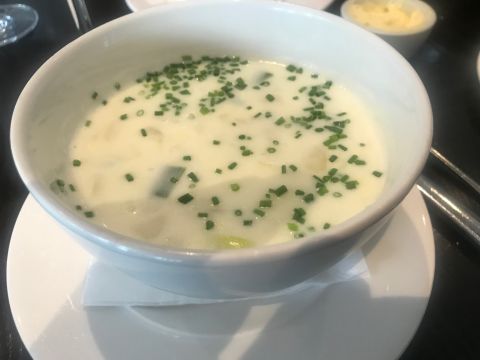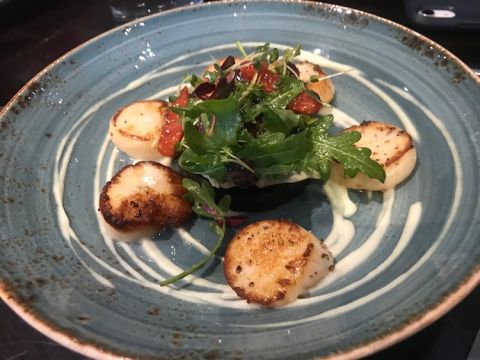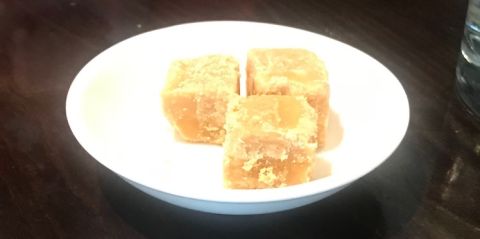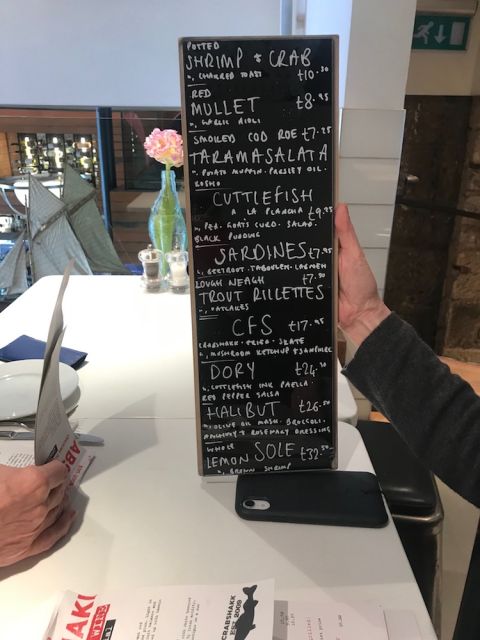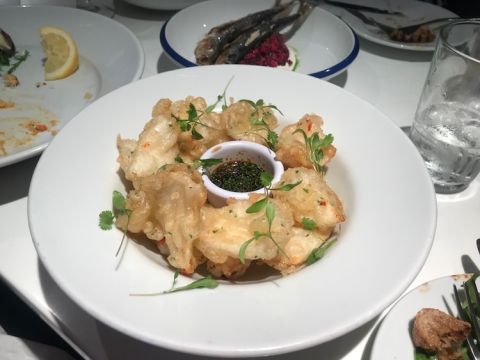Fishy business in Glasgow
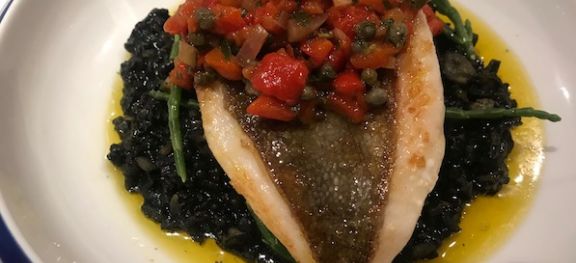
This review appears as a matter of record only. The restaurants described are, sadly, closed until further notice.
On our return to London, at the end of every trip that has included some good eating, I am always asked by Jancis, ‘Which of all our meals was your most enjoyable?’
In this particular case, I was stumped for an accurate answer. Not only because both meals I enjoyed were excellent and distinctive in their own way but also because they had both taken place in the centre of a city we visit relatively rarely, Glasgow.
I had stacked the odds in my favour by stipulating that I was on the lookout for restaurants that specialise in fish, an ingredient that this city is well placed to show off. Glasgow is the main commercial port on the west coast where so much fish is fished, and has been the entrepôt for the many bounties of the sea – lobsters, crabs, sea bass, flat fish of every description – that have for many years been appreciated around the world, in France, Spain, Italy and China, far more than they have been in Scotland.
Nowhere had as much impact on me as a late Saturday lunch at the cleverly named Fish People Cafe on Glasgow’s south side. This we reached from the city centre via a trip on the city’s Underground, known locally as The Clockwork Orange because it's circular, and the original trains were orange, which we got off at Shields Road. Straight outside are two outposts of Andy Bell’s fish empire, a wet-fish shop and, opposite this, the restaurant.
What the shop must have felt like 20 years ago when Bell first opened here can only be guessed at. Today, the whole area still feels pretty untidy with flyovers, the motorway to the city’s airport and quite a lot of empty, disused buildings around and about. But the canopy outside the restaurant is welcome and welcoming.
And once inside, one could easily be in much warmer climes. A large marble bar proclaims the words ‘crabs, lobsters, langoustines, mussels and clams’ while the walls are hung with black and white photos of fish from the shop. As importantly, the waiters, Chris and Graham, perform a formidable double act, both smiling and personable.
The greatest advantage that fish restaurants, or those that mainly concentrate on this wonderful ingredient, have over other restaurants is their specials. However these are presented – and here they are spoken and appear on a small blackboard – they invariably offer the freshest, the most recently caught, fish. Here they offered two: a sashimi of Shetland organic salmon with pickled ginger, and cullen skink, one of my favourite soups.
This version of the soup was delightful. Lots of the essential ingredients – cubes of potato, small slices of leek, creamy, smoked haddock – but most impressively of all it was a soup that was not too heavy. I followed this with monkfish from Barra, an island on the West Coast, with tiger shrimp and red pepper; my sister chose the scallops, below, also from Barra, that had been seared and served with a slice of black pudding from Ramsays of Carluke, a 45-minute train ride south-east of Glasgow. Each was excellent.
As was the one dessert I ordered, a bitter chocolate mousse, with four spoons. But I should not have bothered. This is another restaurant that adheres to my principle that the final ingredient that you eat often stays in your memory the longest. Here they offered us all a piece of absolutely delicious tablet, Scotland’s sugary answer to fudge (see www.bakingwithgranny.co.uk for a simple recipe). I happily paid my bill of £175 for four of us including a £28 bottle of Simonsig Chenin Blanc 2018, without service.
This lunch took place on Saturday 14 March when the threat of coronavirus was very much in the air. Only 24 hours later, the virus seemed very much more real as we took our seats at the large table on the mezzanine floor of Crabshakk, the seafood restaurant that was opened by architect John Macleod in 2009 and has done so much to transform this part of the city, Finnieston.
Little has changed internally since the opening. The same large model sailing boats dominate the ground floor while the mezzanine level is adorned with black and white photos of John and his brother as they were growing up in Stornoway. The building’s height, at 4.2 metres (nearly 14 ft), was just tall enough to allow a mezzanine, an addition that means pieces of rubber have to be fixed to the ceiling to curb head injuries, but this does mean that the restaurant can seat an economic number of customers, who, in normal times, form a compact, and boisterous, crowd.
Except, of course, on a day before a voluntary closure, when cancellations and no-shows had flooded in. But that did not stop Angela, who has been here since Crabshakk first opened, welcoming us extremely warmly and David, the head chef who began here as a sous chef at the same time, and his team cooking so well for us.
Crabshakk’s menu design is idiosyncratic, six thin pieces of paper stapled together with the words Crabshakk and Est 2009 in bright red alongside the slogan Cracking Good Food (a menu I realise I overlooked in my book On The Menu). But as tempting as the dishes on the regular menu are, do not overlook their specials blackboard. From the former we enjoyed the tempura squid with soy and a coriander dipping sauce shown below (£8.95); three crab cakes (£9.95); and the lovely dish of seared scallops highlighted by anchovies (£9.95).
From the handwritten blackboard, we enjoyed a dish of taramasalata with a potato muffin (£7.25); two plump sardines on a beetroot tabouleh with labneh (£7.95) and two main courses. The first was a large fillet of John Dory (£24.50), probably my favourite white fish, on squid ink paella, and a magnificent rendition of CFS, Crabshakk deep-fried squid, where a skate wing is initially marinated in buttermilk and a whole host of herbs before being coated in mixture of flour, cornflour, paprika and chili powder (£17.95). Then the skate is deep fried, a style of cooking the Scots have made their own.
We did not bother with any of the desserts, settling instead for a macchiato and another delicious piece of tablet.
The Fish People Cafe 350a Scotland Street, Glasgow G5 8QF; tel +44 (0)141 429 8787
Crabshakk 1114 Argyle St, Finnieston, Glasgow G3 8TD; tel +44 (0)141 334 6127
Become a member to view this article and thousands more!
- 15,399 featured articles
- 274,776 wine reviews
- Maps from The World Atlas of Wine, 8th edition (RRP £50)
- The Oxford Companion to Wine, 5th edition (RRP £50)
- Members’ forum
- 15,399 featured articles
- 274,776 wine reviews
- Maps from The World Atlas of Wine, 8th edition (RRP £50)
- The Oxford Companion to Wine, 5th edition (RRP £50)
- Members’ forum
- Commercial use of our Tasting Notes

